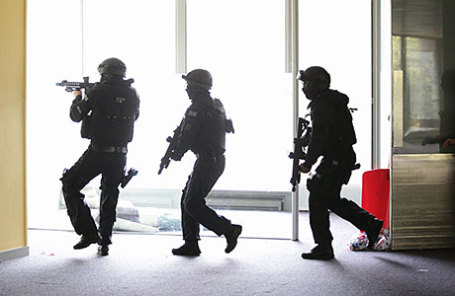 A RAMPAGE by gun-toting Islamists in a provincial city has exacerbated an already tense situation in what has generally been the most tranquil of Central Asia’s five post-Soviet states.
A RAMPAGE by gun-toting Islamists in a provincial city has exacerbated an already tense situation in what has generally been the most tranquil of Central Asia’s five post-Soviet states.
On June 5th a band of insurgents, said by officials to number 26, raided two hunting-supply shops for weapons in Aktobe, a powerhouse of the oil industry in north-western Kazakhstan, around 100km (62 miles) south of the border with Russia. They then attacked an army base. The next day, after a night of clashes, a checkpoint near the city was attacked. By the time the violence subsided, at least 18 gunmen, four civilians and three security men had been killed.
The event has badly shaken Kazakhstan, a country of 18m, most of whom are secular-minded Muslims. Official investigators have blamed home-grown Islamist extremists receiving instruction from abroad. Since April the government’s nerves have been frayed by a series of protests highlighting discontent in at least half a dozen towns across the country.
Since the Soviet Union broke up a quarter of a century ago, Kazakhstan has been ruled by Nursultan Nazarbayev, now 75, who was re-elected president last year with 98% of voters supposedly giving him their approval. Though independent monitors said the ballot was rigged, most Kazakhstanis have accepted his iron-fisted rule in exchange for rising living standards—thanks mainly to high oil prices. But the oil-price slump has burst the economic bubble, and the social contract with Mr Nazarbayev is eroding.
A series of protests that began in April were ostensibly against land-reform proposals that would, among other things, have extended the length of leases available to foreigners. This conjures up the unpopular prospect of large-scale acquisitions by Chinese incomers. Though Mr Nazarbayev issued a moratorium and his officials heralded a public debate, the protests have continued sporadically. On May 21st thousands of people in cities across Kazakhstan took to the streets. Their protests have grown broader, and more directly political. The slogan “Shal ket!” (“Old man out!”) has proliferated on social media.
About 40 activists were arrested ahead of the demonstrations on May 21st. But the protests went ahead, including in Astana, the capital, which lies in the north of the vast country; in Almaty, the commercial capital in the south-east; in industrial towns in the north; and in oil towns in the west. The police forcibly dispersed the crowds. According to civil-rights campaigners, police arrested more than 1,000 people, mainly in Astana and Almaty. Most were released quickly, but a handful now face criminal charges that could land them behind bars for years.
Not for the first time the government has resorted to conspiracy theories. First state-run media called the land-reform protesters “provocateurs” financed by Western conspirators plotting revolution. Then authorities claimed that Tokhtar Tuleshov, a pro-Russian businessman already facing corruption charges, fomented the protests in an effort to overthrow Mr Nazarbayev. Whatever the explanation, the president is understandably jittery. Events in Aktobe will have made him even more so.
www.economist.com, 10.06.2016




